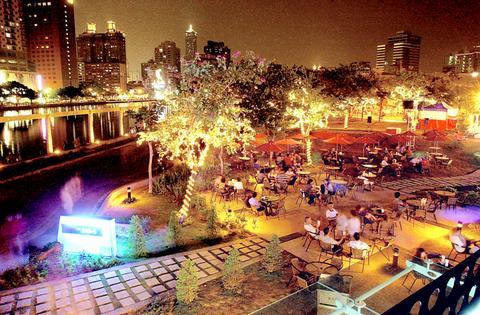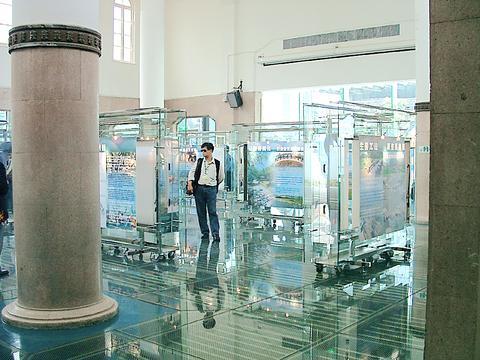Though Kaohsiung Mayor Frank Hsieh (謝長廷) is seen as the frontrunner for the Democratic Progres-sive Party's (DPP) nomination for the 2008 presidential election, he has declined to comment on his career plans. His current amibition, he says, is to promote Kaohsiung as a "Friendly City" (友善城市).
One night earlier this month, Hsieh was playing the ocarina, a small wind instrument, in a cafe called "Hobby Mannbo" located on the banks of the Ai River (
Since there was a professional band playing in the cafe, he was simply pushed by his guests to show his amateur talent. He therefore stepped upon the stage and played in a relaxed way. The performance was typical of his easygoing style.

PHOTO: CHANG CHUNG-YI, TAIPEI TIMES
The patrons immediately recognized him and responded to his performance with enthusiastic applause. When he stepped down from the stage, people approached him, asking him for autographs and taking pictures. His popularity was obvious.
Hsieh does not take this for granted. He earned his support by his efforts to launch several major infrastructure projects in the city, and he won his 2002 re-election by only a thin margin of some 20,000 votes over his Chinese Nationalist Party (KMT) rival, Huang Jun-ying (黃俊英).
In the presidential election last month, President Chen Shui-bian's (

PHOTO: LINDY YEH, TAIPEI TIMES
Hsieh's most visible achievements include cleaning up the Chienchen River (
The Ai River's transformation is part of an effort initiated by Hsieh's predecessors, which began around 20 years ago. But Hsieh has spent four years and a budget of NT$2 billion cleaning the Chienchen River.
The heavy pollution in the two rivers was so notorious that the Chienchen River was once called the "black dragon river" (
Nowadays, the areas along the two rivers have become trendy again, with luxury houses, apartment buildings, shops and cafes springing up along the riverbanks. Several yachts in the Ai River are in service for tourists.
Luxury apartment buildings with river views have lured celebrities and prominent citizens, such as Deputy Secretary-General to the Presidential Office Chen Che-nan (
Real estate prices along the two rivers have appreciated 10 to 20 percent since the SARS outbreak last year, according to information released on April 4 by Rebar Rehouse (
Besides the riverbank areas, districts around the newly-developed parks, like the Neiweipi Cultural Park (
Kaohsiung's MRT, which is under construction, is another boon for shops and businesses. Real estate close to MRT stations is also appreciating by at least 10 percent on average, Rebarnet said.
"Southern Taiwan's economy has been sacrificed by the central government's national policy, which has long favored Northern Taiwan in all aspects. Our main goal [in developing Kaohsiung] is to make Kaohisung Taiwan's business center, as Taipei is the political center," said Wu Mon-ter (
Not only was southern Taiwan's economy victimized, but "the southern Taiwan people's dignity was hurt, too. It's time to win back confidence, " said Albert Lin (
The belief that southern Taiwan has been slighted by the central government is related to its background as the base of Taiwan's industry and agriculture, while most middle class, upper class and social elites have traditionally lived in northern Taiwan, which is perceived as having greater business and career opportunities.
Thus, a project dubbed "Friendly City" has been put in place to promote the harbor city as the ocean capital of Taiwan.
For a long time, Kaohsiung has been an industrial base and most residents have been blue-collar workers. In addition to heavy industrial pollution, quality of life was poor.
Therefore, the city had long been stigmatized as a "cultural desert," Hsieh said in a brochure entitled "Friendly City."
"But all of that belongs to the past," Hsieh said.
In a bid to gather more ideas about strengthening Kaohsiung's cultural character as a "friendly city," the city government invited people from literary and artistic circles for a visit in mid-April.
In a meeting with city officials, the poet Xiang Yang (
"Mr. Yeh may be unwilling to be bothered by tourists, but it will be a good move to showcase the city's abundent literary resources," said Xiang Yang, which is the poet's pen name.
Sun Ta-chuan (
"Kaohsiung used to be a stop-over for many young Aboriginal people from Taitung -- such as myself -- before going on to Taipei. It would be nice to create an Aboriginal atmosphere at Hsiaokang International Airport (
But for some Kaohsiung residents, like writer Wang Chia-hsiang (
"It is accepted that Mayor Hsieh's staff is competent and energetic. But the team has pushed city development at such a high speed that the city councilors are unable to catch up," Wang said.
Wang's remark refers to the grassroots background of many Kaohsiung city councilors, whose credibility as supervisors has been jeopardized by former Council Speaker Chu An-hsiung's (
"For instance, why do we need so many Western-style cafes along the Ai River, instead of local-style tea houses? In my opinion, the City Light Corridor (
But even as most people agree that the choice between drinking traditional tea or imported coffee is a question of personal taste, so too do most people agree that the question of whether the City Light Corridor -- located near the river -- is an artistic success is a matter of individual opinion. But there has emerged a consensus among residents to try to preserve the city's past and its memories. How this will be accomplished is not always clear, but some effort has been made.
For example, the old main hall of the Kaohsiung train station was moved 82m away last year to allow construction that will integrate the train service and the yet-to-be-completed High Speed Rail and MRT.
Now, the old train station hall serves as an exhibition center, and will be moved back to its original location in 2010 and put in service as a city museum. In addition, the old city government building has been preserved as a municipal museum of history.
"The old train station reminds me of my first love, during my high school years," recalled poet Lee Ming-yung (
As a high school boy who had to commute from his hometown of Pingtung to Kaohsiung to study, "I always met my girlfriend in front of the main hall of the train station for our dates," Lee said.
Among the many old stories shared by Kaohsiung residents, the most popular one is the tragic tale of a pair of lovers who drowned themselves in the Kaohsiung River (
"A rich history contributes to the charm of a city, and we are always aware of this while mapping out a blueprint for the city's future," Albert Lin said.

Alain Robert, known as the "French Spider-Man," praised Alex Honnold as exceptionally well-prepared after the US climber completed a free solo ascent of Taipei 101 yesterday. Robert said Honnold's ascent of the 508m-tall skyscraper in just more than one-and-a-half hours without using safety ropes or equipment was a remarkable achievement. "This is my life," he said in an interview conducted in French, adding that he liked the feeling of being "on the edge of danger." The 63-year-old Frenchman climbed Taipei 101 using ropes in December 2004, taking about four hours to reach the top. On a one-to-10 scale of difficulty, Robert said Taipei 101

Nipah virus infection is to be officially listed as a category 5 notifiable infectious disease in Taiwan in March, while clinical treatment guidelines are being formulated, the Centers for Disease Control (CDC) said yesterday. With Nipah infections being reported in other countries and considering its relatively high fatality rate, the centers on Jan. 16 announced that it would be listed as a notifiable infectious disease to bolster the nation’s systematic early warning system and increase public awareness, the CDC said. Bangladesh reported four fatal cases last year in separate districts, with three linked to raw date palm sap consumption, CDC Epidemic Intelligence

US climber Alex Honnold left Taiwan this morning a day after completing a free-solo ascent of Taipei 101, a feat that drew cheers from onlookers and gained widespread international attention. Honnold yesterday scaled the 101-story skyscraper without a rope or safety harness. The climb — the highest urban free-solo ascent ever attempted — took just more than 90 minutes and was streamed live on Netflix. It was covered by major international news outlets including CNN, the New York Times, the Guardian and the Wall Street Journal. As Honnold prepared to leave Taiwan today, he attracted a crowd when he and his wife, Sanni,

Taiwanese and US defense groups are collaborating to introduce deployable, semi-autonomous manufacturing systems for drones and components in a boost to the nation’s supply chain resilience. Taiwan’s G-Tech Optroelectronics Corp subsidiary GTOC and the US’ Aerkomm Inc on Friday announced an agreement with fellow US-based Firestorm Lab to adopt the latter’s xCell, a technology featuring 3D printers fitted in 6.1m container units. The systems enable aerial platforms and parts to be produced in high volumes from dispersed nodes capable of rapid redeployment, to minimize the risk of enemy strikes and to meet field requirements, they said. Firestorm chief technology officer Ian Muceus said